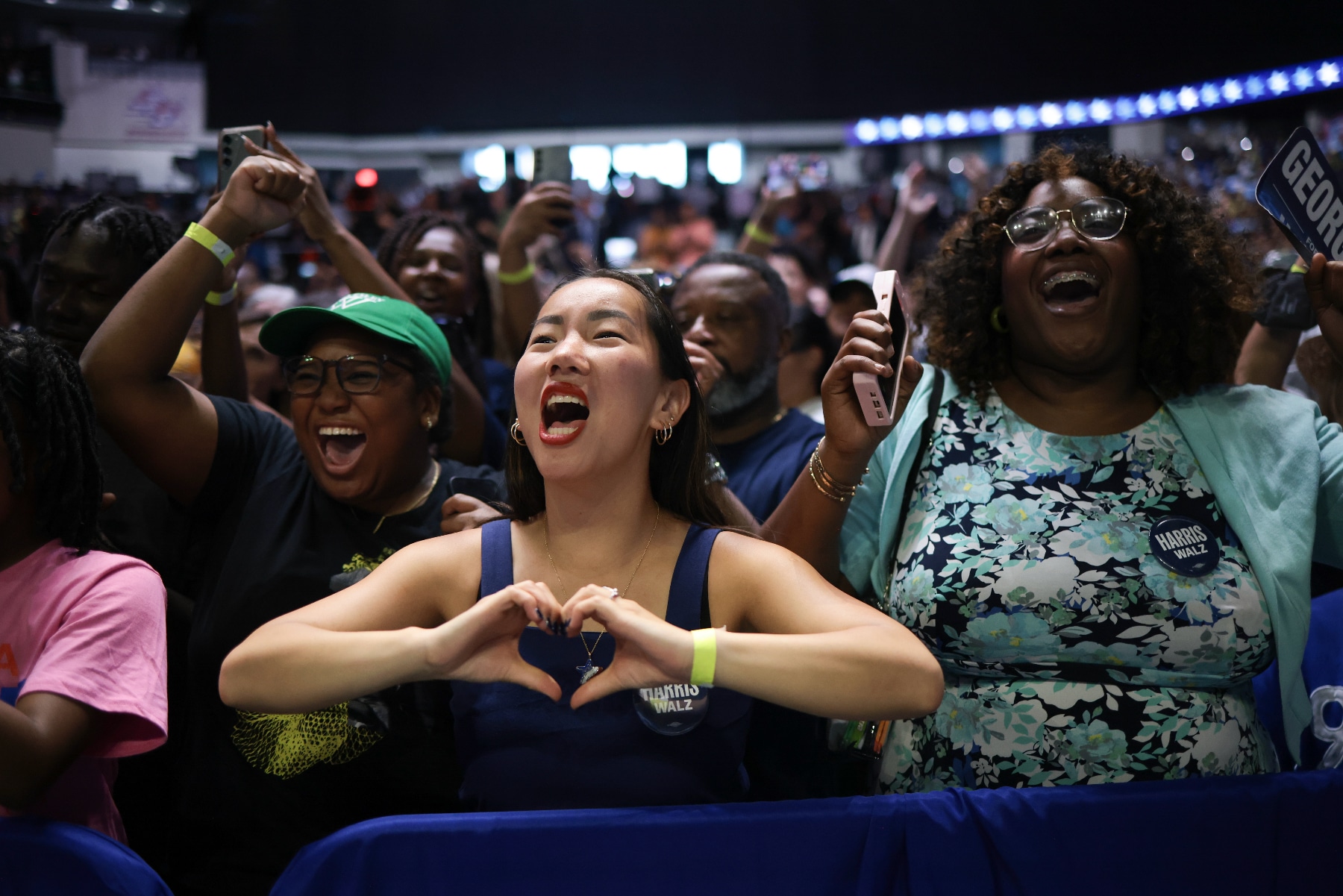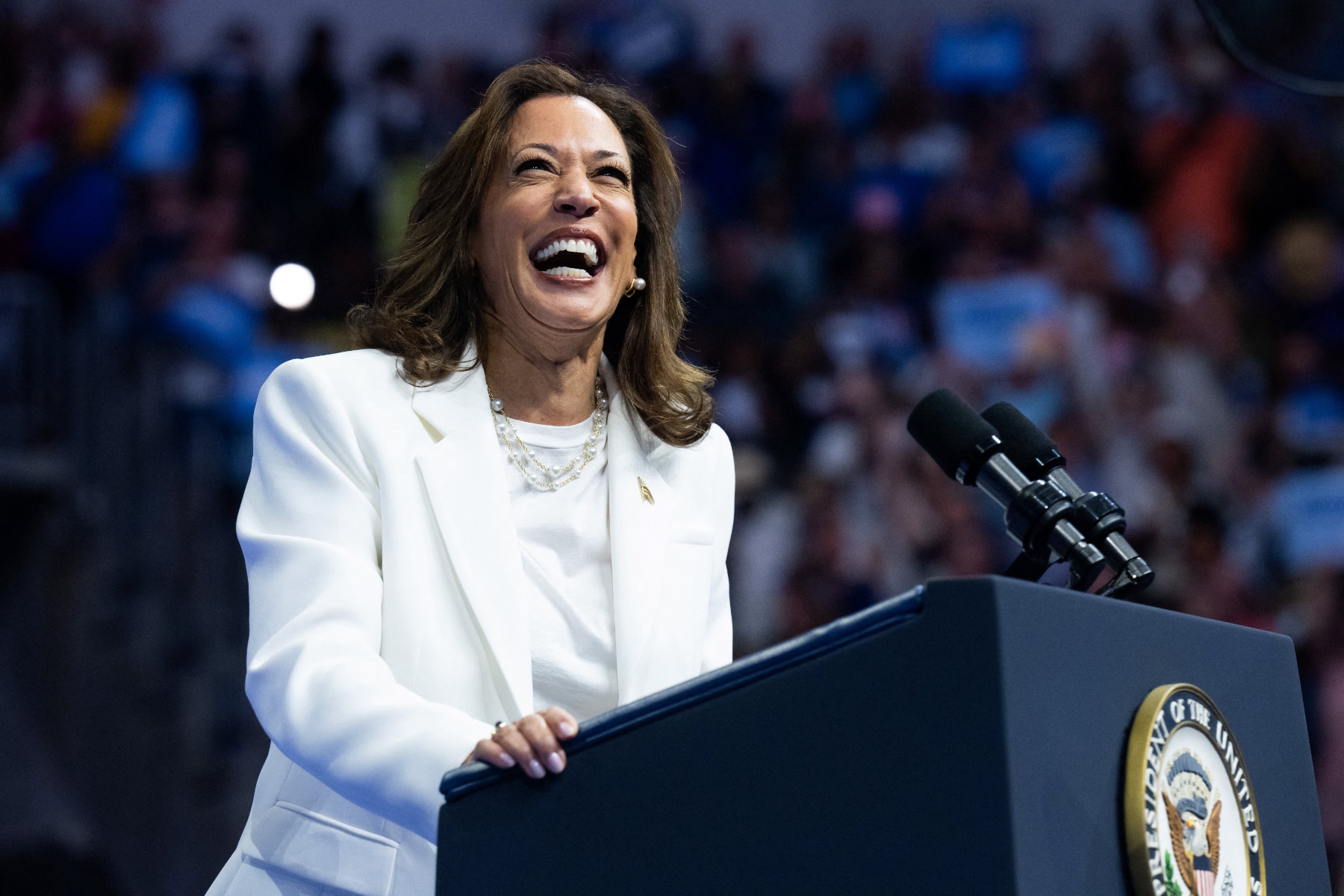This column first appeared in The Amendment, a biweekly newsletter by Errin Haines, The 19th’s editor-at-large. Subscribe today to get early access to future Election 2024 analysis.
Kamala Harris’ campaign for president has been largely defined by joy — which some people seem to think is a bad thing.
Last month, New York Times opinion columnist Patrick Healy wrote that “Joy is not a strategy.”
“Being our joyful Momala is not going to win the election,” he argued, and warned that Harris “can’t coast on joy.”
But it’s not just Harris’ happy warrior approach that’s a problem. Talking to Kara Swisher on her podcast last month, Democrat David Axelrod — former senior adviser to President Barack Obama, candidate of “hope and change” in 2008 — cautioned his party against “irrational exuberance” as Harris’ candidacy has continued to draw cheering, excited crowds by the thousands.
If hope and fear can be successful political strategies — and they have been in recent presidential election cycles — then why not joy?
Americans’ right to the pursuit of happiness is enshrined in our founding document. And in 1932, Democratic standard bearer Franklin D. Roosevelt gave the party its unofficial theme song, “Happy Days Are Here Again,” a tune rooted in American optimism.
Harris’ joy is about brighter days ahead for Americans. It’s her pitch after the exhaustion of surviving a global pandemic and grappling with national reckonings around race and gender. It’s also a contrast to former President Donald Trump’s past-focused pledge to “Make America Great Again,” one that’s often about being afraid of a changing country that he says is leaving certain people behind.
For many Black Americans – particularly Black women – joy has long been a form of resilience and resistance, a method of survival. For Harris, it is also now political, as a key pillar of her campaign that is resonating with many Democrats. It’s attracting Americans who may be curious about her and this new feeling in our politics and tired of the divisive climate that has dominated much of the last decade.
Harris’ joy is also a visible rejection of the idea of the “angry Black woman,” a stereotype rooted in racism and misogyny that has long worked to dismiss and diminish Black women’s voices, leadership and agency across society. In this campaign, it is Trump who is the angry one, lashing out at Harris with personal attacks.
Her joy is a tactic that has disarmed Trump, a branding expert known for labeling his opponents into defeat, but who has not yet come up with an effective line of attack against Harris. On the campaign trail and in interviews, he mocks her characteristic laugh, which has sometimes come across as a quirk or sign of nervousness, but that she now owns as an audible act of joy.
Joy alone will not win an election, and Harris herself has emphasized this as she has worked to earn voters’ support. Last week, she did her first sit-down interview as the Democratic nominee after a growing drumbeat of calls for her to take hard questions from a serious journalist. On Tuesday, Harris and Trump will face off in their first presidential debate, another test of her candidacy and opportunity to introduce herself to Americans in a different context.
She has begun to lay out her plans for governing in more detail, with a focus on the middle class around affordability and homeownership. Her previous roles as U.S. senator, where she excoriated GOP nominees for Cabinet posts and the Supreme Court during Trump’s administration, and her decades-long career as a prosecutor helped establish her reputation as a fighter.
And in her pitch to voters to turn out in November, Harris frames the act of participating in our democracy not as the burden it has felt like for so many in the age of attempted voter suppression, but as our duty and privilege as American citizens.

Win McNamee/Getty Images
Even as she talks about how Americans are struggling, she talks about an economy that creates opportunity for all, and she embraces a sense of optimism, joy and patriotism that was missing among Democrats.
While the campaign emphasizes that it sees itself as an underdog in a close election, there are signs that joy is a strategy that is working: Poll numbers suggest a close and competitive race in the battleground states Harris will need to win. She raised more than $540 million in just over a month – more than any political campaign in history in that time frame. At rallies across the country, the campaign has recruited tens of thousands of volunteers to text, make calls and knock on doors. And grassroots efforts have sprouted to support Harris by a parade of groups including women, men, LGBTQ+, evangelicals, chefs and more gathering on Zoom calls to organize and fundraise.
Emotion is typically seen as a sign of weakness in our male-dominated society. But with a woman now at the top of the ticket, what if joy could be considered not a liability, but an asset to leadership and part of how we begin to heal as a nation?
Four years ago, Harris’ joy was not front and center; now it’s something that is helping her introduce herself to voters as she has gone from a candidate who was guarded to one who is more authentic. Combined with her vision for the presidency and the campaign’s ongoing plans to get voters to the polls, joy may be part of a winning formula for Harris in November.





